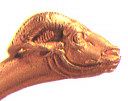
site map
Golden Fleece > Ancient Landmarks
craftsman's art and music's measure
for thy pleasure all combine.
Ancient Landmarks
Remove not the ancient landmark
This well known text from Proverbs occurs in the context of a collection of wise sayings about life and conduct. The full text in the King James Bible is:
Remove not the ancient landmark, which thy fathers have set. Seest thou a man diligent in his business? he shall stand before kings; he shall not stand before mean men. When thou sittest to eat with a ruler, consider diligently what is before thee: And put a knife to thy throat, if thou be a man given to appetite. Be not desirous of his dainties: for they are deceitful meat. Labour not to be rich: cease from thine own wisdom. Wilt thou set thine eyes upon that which is not? for riches certainly make themselves wings; they fly away as an eagle toward heaven. Eat thou not the bread of him that hath an evil eye, neither desire thou his dainty meats: For as he thinketh in his heart, so is he: Eat and drink, saith he to thee; but his heart is not with thee. The morsel which thou hast eaten shalt thou vomit up, and lose thy sweet words. Speak not in the ears of a fool: for he will despise the wisdom of thy words. Remove not the old landmark; and enter not into the fields of the fatherless: For their redeemer is mighty; he shall plead their cause with thee. Apply thine heart unto instruction, and thine ears to the words of knowledge.
Throughout this text, the idea of landmarks designates an inheritance, that is passed from generation to generation. This inheritance may be an actual area of land, which may be cultivated to provide a source of sustenance and wealth for successive generations. It may be a body of knowledge, the accumulated wisdom of ancestors, that offers guidance about the conduct of life and the skills required to pursue a particular occupation. The English word, field retains both these meanings; a piece of ground or a sphere of intellectual activity.
In ancient times, it was customary to mark the boundaries of land by means of stone pillars. It would be wrong for a person to arbitrarily move these stones with the intention of stealing land from a neighbour or infringing the inheritance of the fatherless.
Ancient landmark may also refer to the historical markers, which marked significant events in the stories of Abraham, Isaac and Jacob. At Bethel and Shechem, Abraham marked significant events in his journey from Ur to Egypt with stone landmarks. In the story of Abraham, Shechem represents strength. At Shechem, Joshua set up a large stone to remind Israel of their commitment to worship God alone. "Behold, this stone shall be for a witness against us, for it has heard all the words of the Lord which He spoke to us; thus it shall be for a witness against you, lest you deny your God" (Josh 24:1, 25-27). At Bethel, Jacob dreamt of a ladder connecting heaven and earth. Shechem and Bethel are both within a fertile region, that was the settlement area of the tribe of Ephraim. These place names begin with the ancient Hebrew letters, which represent an ear of corn near a fall of water and are engraved on the tomb of William Schaw. Together they signify abundance, which may be represented by a pomegranate, a symbol of fertility. The recollection of these stories was basis of a spiritual inheritance that defined boundaries for social relationships.
The General Regulations approved by the Grand Lodge of England and published in 1723 included:
"Every Annual Grand Lodge has an inherent power and Authority to make new Regulations or to alter these, for the real benefits of this Ancient Fraternity; provided always that the old Land-Marks be carefully preserved."
For many years, there was no attempt to define the landmarks of freemasonry. Although many masonic writers and Grand Lodge have expressed a range of opinons, there is no common agreement about the landmarks of freemasonry.
A test based on two essential qualifications has been suggested. First that a landmark has existed from "time immemorial". Secondly that a landmark is of such importance that freemasonry would no longer be freemasonry if it were removed. There are in fact very few items that pass this rigid test. Suggested lists of landmarks, often include items which on closer examination are recently adopted regulations, customs, or principles.
Copyright © 2001-2009 The Fleece. All rights reserved.
